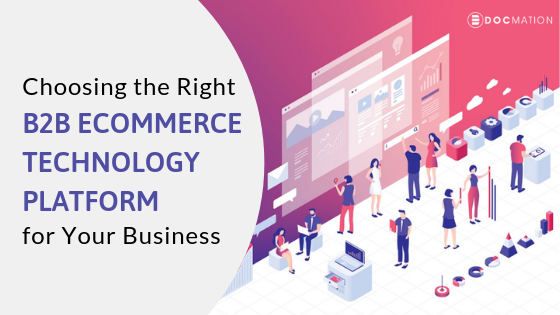With so many easy-to-use B2B e-commerce platforms out there, it has become more and more difficult to decide which one to choose.
Selecting the correct medium for your business can affect how well you can survive on top of updates and content as well as avoid missing out on potential clients due to usability issues.
In most cases, by simply plugging in your logo and some content, an entire solution can be created, instead of taking a more traditional development approach.
Depending on which B2B e-commerce platform is picked by you, this decision can make a world of a difference in the success of your business. It will allow you to have more control over design from start to finish.
Source: salesforce einstein certification
The nature of your business must bring you closer to the B2B e-commerce platform that is right for your products or services.
Think about what’s unique to your business and what you really want in your e-commerce platform.
Here are a few questions you should consider before choosing the right e-commerce platform.
How tech-savvy are you, and will you require any help or support?
Even if you aren’t highly experienced when it comes to designing or developing an e-commerce solution, there are platforms that make this process accessible for beginners.
Assess your skills wisely, and choose a platform that suits your technical capabilities.
What is your budget?
Do your research when deciding the amount of money you’re willing to spend. Careful! Some e-commerce platforms offer add-ons or plug-ins that may require additional costs.
Just keep this in mind when shopping around and make sure you feel 100% sure before making a decision, considering the overall costs and extra charges that may apply.
How much customization will you need?
In some cases, a B2B website platform will offer an array of templates and features to choose from, tailored to various industries.
If you need any additional features, you may require the assistance of a developer.
Try to choose a platform that is dynamically customizable so you don’t need constant help from a developer.
Source: Salesforce Digital 360
Best practices for selecting the right B2B e-commerce platform
Start with writing a business case
The business case should include a return on investment (ROI) based on hard data like site-traffic and average order value, and soft data like reduced operational cost and cost per customer call.
Use your business case to prioritize what you do, and measure the effectiveness of your decision.
A business case and a B2B e-commerce strategy go hand in hand.
Understand the components of an e-commerce system
Source: salesforce commerce
Educate yourself on every aspect of an e-commerce platform, like customer purchase patterns, promotions, and merchandising. Then you can integrate these in your solution.
Get business and IT on the same page
To select a platform that is suitable for your organization, you must balance what you need to deliver with the process of construction.
Source: salesforce b2b
Unite with joint use cases, business cases, and requirement. This should include experience architecture, merchandising tools (product relationships), and management.
Try to be agile and prepared in your approach to avoid any disaster that might come your way.
Source: ecommerce solutions company
To the IT team: Figure out the need of your business counterparts, why they need it, and the tools they require.
The customer experience matters the most, no matter the requirements.
To the business team: Be very clear about your requirements and make sure they are completely understood.
Assess the development status frequently and keep comparing it with your requirements.
Discover which requirements are unique to your business
When writing requirements, the main focus should be on the different ways you are unique.
While you certainly need to understand these needs, it isn’t easy to provide all these requirements right away.
Source: online business platforms
The use case diagrams will trigger a race between who can build your requirements the fastest versus how your organization customizes the right solution. Start your discovery process by doing these things.
Develop use cases: Divert your financial resources into building use cases. Develop use cases that address similar features and that help you find out how to customize for your unique requirements.
Source: b2b commerce salesforce
Ask as many questions as you can: How did you build that? How is it customized?
Make sure that your team has agreed to the use cases: Ideally, everyone in the room supports use cases and has even debated the merits of each. But still, keep a record of approval for each team member.
Source: salesforce subscription
Integration
Integration is absolutely crucial to your success. E-commerce is an ecosystem made up of many back and front office systems.
Source: salesforce analytics
Integration with ERP, CRM, Pricing Engines, Order Management, Content Management (CMS), Product Information (PIM), and many others should be considered.
Understand the process of integrating each platform to your back office. Have a deep technical architecture workshop with your seller. And answer the following questions:
Will you use an Enterprise Service Bus (ESB), Service Oriented Architecture (SOA), bulk files, or all the above?
Source:salesforce einstein
Do you have data quality issues? Understand the consequences of integration and each integration option. You understand your environment; vendors understand their software.
Final thoughts
Source: salesforce analytics cloud
The provision of a friction-less, smooth experience is the most important goal of an e-commerce platform. Your chosen e-commerce platform will ultimately decide the customer experience you will deliver.
Choosing the right B2B e-commerce platform will determine your business’s future.
Make sure you tick all the checkboxes mentioned above, expediting the success of your B2B business model in a way you’ve never dreamed possible.
Source: B2B Ecommerce Platform

No comments:
Post a Comment